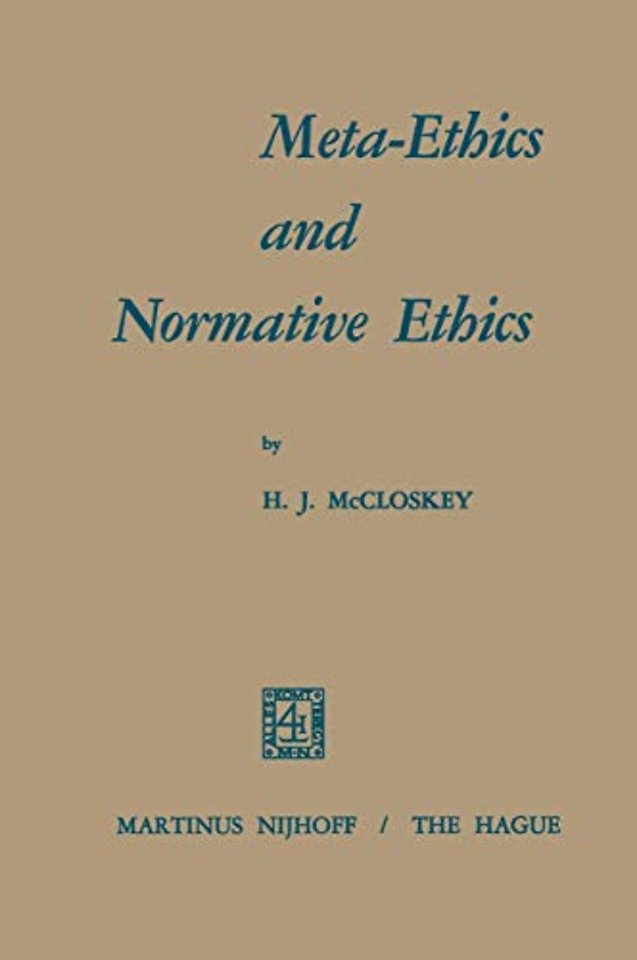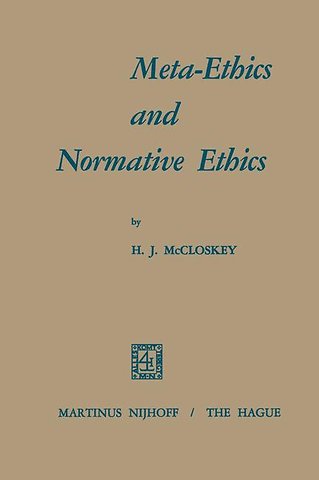1. Introductory: Meta-Ethics, Normative Ethics and Morality.- 1. Levels of Theorizing.- 2. Meta-Ethics.- 3. Normative Ethics and Morality.- 4. Inter-relations between Meta-Ethics and Normative Ethics.- 5. The plan of this work.- A. Meta-Ethics: A Defence of an Intuitionist Ethic.- 2. Theistic and Naturalistic Meta-Ethical Theories.- 1. Theistic Ethics: God as Creator of Morality.- 2. Thomistic Natural Law Ethics.- 3. Naturalistic Theories.- The Naturalistic Fallacy.- Approval Theories.- (a) What is an attitude?.- (b) What is it to approve?.- (c) “Good” means “I approve”.- (d) Relativism as a meta-ethic: ‘Good’ means’ society approves’.- (e) ‘Good’ means ‘approved by the impartial observer’.- 3. Non-Cognitivist Meta-Ethical Theories.- 1. ‘Good’ as expressing feelings and attitudes.- 2. ‘Ought’ as expressing and commanding.- 3. Stevenson: ‘Good’ means ‘I approve; do so as well’.- 4. Hare’s Ethical Subjectivist Prescriptivism.- 5. Nowell-Smith’s Ethics.- 4. A Positive Approach: Intuitionism and the Nature of the Objective Moral Facts.- 1. The Factual Character of Moral Discourse.- 2. Moral Principles: Their Synthetic A Priori Character.- 3. Moral Perplexity: Deliberation and Reasoning.- 4. Moral Advice.- 5. Teaching and Learning Moral Concepts and Truths.- 6. Similarities and Differences Between ‘Good’, ‘Right’, ‘Ought’, and ‘Duty’.- 7. The Accounts Suggested by These Logical Features of Moral Expressions.- (a) ‘Good’ as the name of a property.- (b) ‘Right’ as the name of a relation.- (c) ‘Ought’ and Reasons for acting.- 5. Intuitionism: How we Come to Gain Moral Knowledge.- 1. Intuitive Insight as Rational Apprehension of Necessary Truths: The Powers of Reason.- 2. Synthetic a priori propositions.- 3. Truth Tests and Intuitive Insights.- 4. Intuitionism and Tolerance.- 5. Multiple Intuitions.- 6. Summary of Conclusions.- Note A. Meta-Theories of Rights.- Note B. Concerning Revisionary Meta-Ethics.- B. Normative Ethics: The Case for Ethical Pluralism.- Introducing Part B. from Meta-Ethics to Normative Ethics.- 6. Intrinsic Goods.- 1. Pleasure and Happiness.- 2. Knowledge.- 3. Rationality and Rational Belief.- 4. Beauty and Aesthetic Excellence.- 5. Moral Goodness.- 6. Self-perfection.- 7: Monistic Theories of Absolute Obligation: Utilitarianism.- 1. Varieties of Utilitarianism.- (a) Radical and Conservative Utilitarianism.- (b) Hedonistic, Eudemonistic, and Ideal Utilitarianism.- (c) Act and Rule Utilitarianism.- 2. Act Utilitarianism.- 3. Rule Utilitarianism.- 8. Pluralistic Theories of Absolute Obligation: Kant and Natural Law.- 1. The Kantian Theory.- (a) Formula 1.- (b) Formula 2.- 2. Thomistic Natural Law Ethics.- 9. A Positive Approach: Prima Facie Duties.- 1. Presumptions in Favour of a Theory of Prima Facie Duties.- 2. The Nature of Prima Facie Duties.- (a) Promotion of Good, Elimination of Evil.- (b) Justice.- (c) Respect for persons.- (d) Honesty.- 3. Interconnexions between prima facie duties.- 4. The Prima Facie Character of Prima Facie Obligations.- 5. Prima Facie Ought and ‘Can’.

